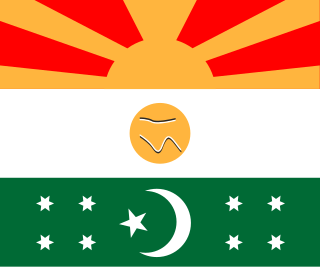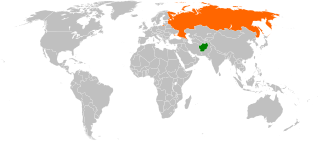| |||||
| Decades: | |||||
|---|---|---|---|---|---|
| See also: | Other events of 1921 List of years in Afghanistan | ||||
The following events happened during 1921 in Afghanistan.
| |||||
| Decades: | |||||
|---|---|---|---|---|---|
| See also: | Other events of 1921 List of years in Afghanistan | ||||
The following events happened during 1921 in Afghanistan.
Henry Dobbs arrives in Kabul to continue the conversations which were begun at Mussoorie in the previous year. [1]
A mission of five members, headed by Gen. Mohammad Daoud Khan, leaves Afghanistan for Europe in order to examine the possibility of entering into political and commercial relations with European states. The mission visits Moscow, where in March it signs a Turco-Afghan treaty providing for mutual assistance between the two countries in case of attack by a third party. From Moscow it goes to Riga, and thence to Angora, in order to explain the treaty to the Turkish headquarters. The head of the mission there makes bitter Anglophobe speeches, and in an interview states that it is the duty of the entire Muslim world to help the Turkish nationalists.
A treaty between the Bolshevik government of Russia and the amir is signed. British Foreign Secretary Lord Curzon states on one occasion that the Soviet government has offered the Afghans a subsidy of £100,000 a year.
Lord Chelmsford says in the House of Lords that he is confident the discussions at Kabul will have a salutary effect and produce valuable results. For a long time, however, they continue to hang fire. This is due to the leanings of the amir towards Russia and Turkey.
A son and heir is born to the amir.
The amir announces the completion of a code of criminal procedure with the effect, in his own words, of "making Afghanistan truly free and independent".
The Afghan envoy at Angora gives a banquet in honour of Fakhri Pasha, who is leaving for Kabul, at which speeches extolling Islamic union are made.
A treaty (amending the Treaty of Rawalpindi agreed originally in August 1919) between the Britain and Afghanistan is signed at Kabul, on the Afghan government giving written assurances that no Russian consulates will be permitted in the areas adjoining the Indian frontier. The treaty reaffirms Britain's recognition of Afghanistan's complete independence, and restores to the Afghans the privilege of importing munitions through India. A small area near the head of the Khyber Pass is transferred to Afghanistan, and Sir Henry Dobbs carries out the realignment of the frontier on crossing over to India on December 4. King George V sends a message of congratulation to the amir, who telegraphs a reply expressing deep appreciation of His Majesty's message, and hoping relations between the countries will grow closer.

Abdur Rahman Khan also known by his epithets, The Iron Amir, was Amir of Afghanistan from 1880 to his death in 1901. He is known for perpetrating the Hazara Genocide, but also uniting the country after years of internal fighting and negotiation of the Durand Line Agreement with British India.

European influence in Afghanistan has been present in the country since the Victorian era, when the competing imperial powers of Britain and Russia contested for control over Afghanistan as part of the Great Game.

The Great Game was a rivalry between the 19th-century British and Russian empires over influence in Central Asia, primarily in Afghanistan, Persia, and Tibet. The two colonial empires used military interventions and diplomatic negotiations to acquire and redefine territories in Central and South Asia. Russia conquered Turkestan, and Britain expanded and set the borders of British colonial India. By the early 20th century, a line of independent states, tribes, and monarchies from the shore of the Caspian Sea to the Eastern Himalayas were made into protectorates and territories of the two empires.

The Durand Line, also known as the Afghanistan–Pakistan border, is a 2,640-kilometre (1,640 mi) international border between Afghanistan and Pakistan in South Asia. The western end runs to the border with Iran and the eastern end to the border with China.

Emir Dost Mohammad Khan Barakzai, nicknamed the Amir-i Kabir, was the founder of the Barakzai dynasty and one of the prominent rulers of Afghanistan during the First Anglo-Afghan War. With the decline of the Durrani dynasty, he became the Emir of Afghanistan in 1826. An ethnic Pashtun, he belonged to the Barakzai tribe. He was the 11th son of Payinda Khan, chief of the Barakzai Pashtuns, who was killed in 1799 by King Zaman Shah Durrani.

The Third Anglo-Afghan War began on 6 May 1919 when the Emirate of Afghanistan invaded British India and ended with an armistice on 8 August 1919. The Anglo-Afghan Treaty of 1919 resulted in the Afghans gaining control of foreign affairs from Britain, and the recognition of the Durand Line as the border between Afghanistan and British India.

The Second Anglo-Afghan War was a military conflict fought between the British Raj and the Emirate of Afghanistan from 1878 to 1880, when the latter was ruled by Sher Ali Khan of the Barakzai dynasty, the son of former Emir Dost Mohammad Khan. The war was part of the Great Game between the British and Russian empires.

The Treaty of Gandamak officially ended the first phase of the Second Anglo-Afghan War. The Afghan emir Mohammad Yaqub Khan ceded various frontier areas as well as Afghanistan's control of its foreign affairs to the British Raj.

The Provisional Government of India was a government-in-exile established in Kabul on December 1, 1915 by the Indian Independence Committee during World War I with support from the Central Powers. Its purpose was to enrol support from the Afghan Emir as well as Russia, China, and Japan for the Indian nationalist movement. Established at the conclusion of the Kabul Mission composed of members of the Berlin Committee, German and Turkish delegates, the provisional government was composed of Mahendra Pratap as President, Maulana Barkatullah as Prime Minister, Deobandi Maulavi Ubaidullah Sindhi as Home Minister, Deobandi Maulavi Bashir as Minister of War, and Champakraman Pillai as Foreign Minister. The provisional government found significant support from the internal administration of the Afghan government, although the Emir refused to declare open support, and ultimately, under British pressure it was forced to withdraw from Afghanistan in 1919.
The following lists events that happened during 1900 in Afghanistan.
The following lists events that happened during 1904 in Afghanistan.
The following lists events that happened during 1907 in Afghanistan.
The following lists events that happened during 1919 in Afghanistan.
The following lists events that happened during 1922 in Afghanistan.
The following lists events that happened during 1923 in Afghanistan.

The Niedermayer–Hentig Expedition, also known as the Kabul Mission, was a diplomatic mission to Afghanistan sent by the Central Powers in 1915–1916. The purpose was to encourage Afghanistan to declare full independence from the British Empire, enter World War I on the side of the Central Powers, and attack British India. The expedition was part of the Hindu–German Conspiracy, a series of Indo-German efforts to provoke a nationalist revolution in India. Nominally headed by the exiled Indian prince Raja Mahendra Pratap, the expedition was a joint operation of Germany and Turkey and was led by the German Army officers Oskar Niedermayer and Werner Otto von Hentig. Other participants included members of an Indian nationalist organisation called the Berlin Committee, including Maulavi Barkatullah and Chempakaraman Pillai, while the Turks were represented by Kazim Bey, a close confidante of Enver Pasha.
The Berlin Committee, later known as the Indian Independence Committee after 1915, was an organisation formed in Germany in 1914 during World War I by Indian students and political activists residing in the country. The purpose of the committee was to promote the cause of Indian Independence. Initially called the Berlin–Indian Committee, the organisation was renamed the Indian Independence Committee and came to be an integral part of the Hindu–German Conspiracy. Members of the committee included Virendranath Chattopadhyaya, Chempakaraman Pillai, Dr Jnanendra Das Gupta, and Abinash Bhattacharya.

Relations between Afghanistan and Russia first emerged in the 19th century. At the time they were placed in the context of "The Great Game", Russian–British confrontations over Afghanistan from 1840 to 1907. The Soviet Union was the first country to establish diplomatic relations with Afghanistan following the Third Anglo-Afghan War in 1919. On 28 February 1921, Afghanistan and the Soviet Russia signed a Friendship Treaty. The Soviet Union intervened in Afghanistan against the Basmachi movement in 1929 and 1930.

The siege of the British Residency in Kabul was a military engagement of the Second Anglo-Afghan War. The British resident, Sir Louis Cavagnari and his escort were massacred after an 8-hour siege by mutinous Afghan troops inside their Residency in Kabul. This event triggered the second phase of the war, during which an Anglo-Indian army invaded Afghanistan and captured Kabul.

Bilateral relations of Afghanistan and the United Kingdom of Great Britain and Northern Ireland span a long and eventful history, dating back to the United Kingdom's Company rule in India, the British-Russian rivalry in Central Asia, and the border between modern Afghanistan and British India. There has been an Afghan embassy in London since 1922 though there was no accredited Afghan ambassador from 1981 to 2001.